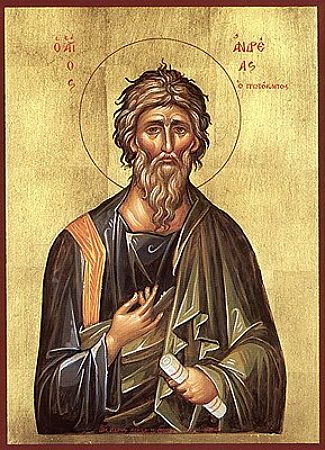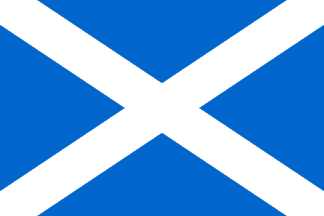 (Greek: Ανδρέας, Andreas), called in the Orthodox tradition Protocletos, or the First-called, is a Christian Apostle and the elder brother of Saint Peter. The name "Andrew" (from Greek : ανδρεία, manhood, or valour), like other Greek names, appears to have been common among the Jews from the second or third century B.C. No Hebrew or Aramaic name is recorded for him.
(Greek: Ανδρέας, Andreas), called in the Orthodox tradition Protocletos, or the First-called, is a Christian Apostle and the elder brother of Saint Peter. The name "Andrew" (from Greek : ανδρεία, manhood, or valour), like other Greek names, appears to have been common among the Jews from the second or third century B.C. No Hebrew or Aramaic name is recorded for him.The Bible records that St Andrew was a son of Jonah, or John, (Matthew 16:17; John 1:42). He was born in Bethsaida on the Sea of Galilee (John 1:44). Both he and his brother Peter were fishermen by trade, hence the tradition that Jesus called them to be his disciples by saying that He will make them "fishers of men" (Greek: ἁλιείς ἀνθρώπων, halieis anthropon). At the beginning of Jesus' public life they occupied the same house at Capernaum (Mark 1:21, 29).
From the Gospel of John we learn that Andrew was a disciple of John the Baptist, whose testimony first led him and John the Evangelist to follow Jesus (John 1:35-40). Andrew at once recognized Jesus as the Messiah, and hastened to introduce Him to his brother(John 1:41). Thenceforth the two brothers were disciples of Christ. On a subsequent occasion, prior to the final call to the apostolate, they were called to a closer companionship, and then they left all things to follow Jesus (Luke 5:11; Matthew 4:19-20; Mark 1:17-18).
In the gospels he is referred to as being present on some important occasions as one of the disciples more closely attached to Jesus (Mark 13:3; John 6:8, 12:22); but in Acts there is only a bare mention of him (1:13).
Eusebius quotes Origen as saying Andrew preached in Asia Minor and in Scythia, along the Black Sea as far as the Volga and Kiev. Hence he became a patron saint of Romania and Russia. According to tradition, he founded the See of Byzantium in AD 38, installing Stachys as bishop (the only bishopric in that neighbourhood before that time had been established at Heraclea). This See would later develop into the Patriarchate of Constantinople. Andrew is recognized as its Patron Saint.
He is said to have been martyred by crucifixion at Patras (Patrae) in Achaea, on a cross of the form called Crux decussata (X-shaped cross) and commonly known as "St. Andrew's cross", at his own request, as he deemed himself unworthy to be crucified on the same type of cross on which Christ was crucified. Saint Andrew is the patron of Patras. According to tradition his relics were moved from Patras to Constantinople, and thence to St. Andrews (see below). Local legends say that the relics were sold to the Romans. The head of the saint, considered as one of the treasures of St. Peter's Basilica, was given by the Byzantine despot Thomas Palaeologus to Pope Pius II in 1461. In recent years, the relics were kept in the Vatican City, but were sent back to Patras by decision of the Pope Paul VI in 1964. The relics, which consist of the small finger, part of the top of the cranium of Saint Andrew and small parts of the cross, have since that time been kept in the Church of St. Andrew at Patras in a special tomb, and are reverenced in a special ceremony every November 30.

St. Andrew Basilica at Patras, where the saint's relics are kept, said to be erected over the place of his martyrdom. The apocryphal Acts of Andrew, mentioned by Eusebius, Epiphanius and others, is among a disparate group of Acts of the Apostles that were traditionally attributed to Leucius Charinus. "These Acts may be the latest of the five leading apostolic romances. The Acts, as well as a Gospel of St. Andrew, appear among rejected books in the Decretum Gelasianum connected with the name of Pope Gelasius I. The Acts of Andrew was edited and published by Constantin von Tischendorf in the Acta Apostolorum apocrypha (Leipzig, 1821) Another version of the Andrew legend is found in the Passio Andreae, published by Max Bonnet (Supplementum II Codicis apocryphi, Paris, 1895).
Propers for Saint Andrew the Apostle
The Collect.
ALMIGHTY God, who didst give such grace unto thy holy Apostle Saint Andrew, that he readily obeyed the calling of thy Son Jesus Christ, and followed him without delay; Grant unto us all, that we, being called by thy holy Word, may forthwith give up ourselves obediently to fulfill thy holy commandments; through the same Jesus Christ our Lord. Amen.
The Epistle - Romans x. 9.
IF thou shalt confess with thy mouth the Lord Jesus, and shalt believe in thine heart that God hath raised him from the dead, thou shalt be saved. For with the heart man believeth unto righteousness; and with the mouth confession is made unto salvation. For the scripture saith, Whosoever believeth on him shall not be ashamed. For there is no difference between the Jew and the Greek: for the same Lord over all is rich unto all that call upon him. For whosoever shall call upon the name of the Lord shall be saved. How then shall they call on him in whom they have not believed? and how shall they believe in him of whom they have not heard? and how shall they hear without a preacher? and how shall they preach, except they be sent? as it is written, How beautiful are the feet of them that preach the gospel of peace, and bring glad tidings of good things ! But they have not all obeyed the gospel. For Esaias saith, Lord, who hath believed our report? So then faith cometh by hearing, and hearing by the word of God. But I say, Have they not heard? Yes verily, their sound went into all the earth, and their words unto the ends of the world. But I say, Did not Israel know? First Moses saith, I will provoke you to jealousy by them that are no people, and by a foolish nation I will anger you. But Esaias is very bold, and saith, I was found of them that sought me not; I was made manifest unto them that asked not after me. But to Israel he saith, All day long I have stretched forth my hands unto a disobedient and gainsaying people.
The Gospel - St. Matthew iv. 18.
JESUS, walking by the sea of Galilee, saw two brethren, Simon called Peter, and Andrew his brother, casting a net into the sea: for they were fishers. And he saith unto them, Follow me, and I will make you fishers of men. And they straightway left their nets, and followed him. And going on from thence, he saw other two brethren, James the son of Zebedee, and John his brother, in a ship with Zebedee their father, mending their nets; and he called them. And they immediately left the ship and their father. and followed him.
Reference and Resources:
http://en.wikipedia.org/wiki/St._Andrew
http://www.commonprayer.org/calend/propers/s_andr.cfm
http://elvis.rowan.edu/~kilroy/JEK/11/30.html
†
No comments:
Post a Comment